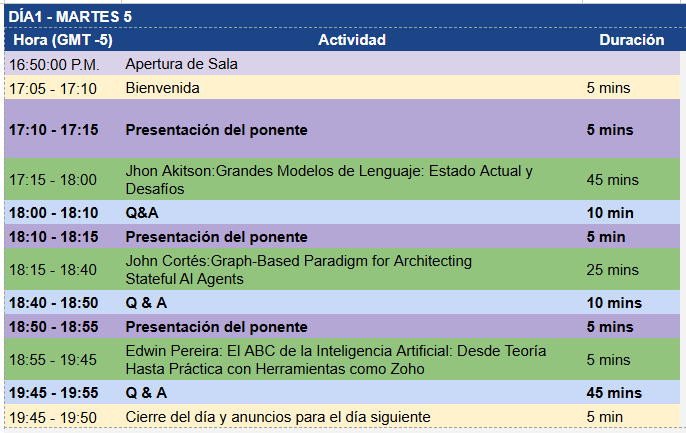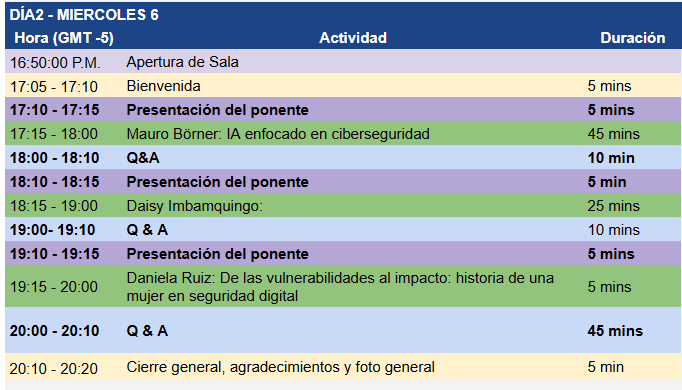VANGUARDIA
1. Event Objective
The main objective of this webinar was to provide the student and academic community with a comprehensive and up-to-date overview of the convergence between Artificial Intelligence (AI) and Cybersecurity. The aim was to offer a space for learning and discussion covering everything from fundamental theoretical concepts to the most advanced applications and human perspectives within these technological fields.
2. Content and Structure
The event was structured around a series of presentations given by experts in the field, covering a wide and diverse range of topics to enrich the knowledge of attendees. The agenda was as follows:
“The ABCs of Artificial Intelligence: From Theory to Practice with Tools such as Zoho”: An introductory session to establish the theoretical and practical foundations of AI.
“Large Language Models: Current Status and Challenges”: An in-depth analysis of LLM technologies, their current impact, and future lines of research and development.
“Graph-Based Paradigm for Architecting Stateful AI Agents”: A technical presentation on advanced architectures for the design and construction of complex AI agents.
“AI and Cybersecurity”: A keynote presentation that explored the synergy, risks, and opportunities at the intersection of both disciplines.
“From Vulnerabilities to Impact: A Woman's Story in Digital Security”: An inspiring case study that provided a human and realistic perspective on careers and professional impact in the field of digital security.
3. Impact and Reach
The webinar was designed for a broad audience, including engineering students, developers, technology professionals, and the general public with an interest in new trends. The event succeeded in fostering dialogue, presenting cutting-edge knowledge, and highlighting the importance of developing skills in areas of high labor demand, thus fulfilling IEEE's mission to promote technology for the benefit of humanity.
Date and Time
Location
Hosts
Registration
-
 Add Event to Calendar
Add Event to Calendar
- Contact Event Hosts
-
datupizap@uce.edu.ec
- Co-sponsored by Universidad Central del Ecuador
Speakers
Daniela
From vulnerabilities to impact: a woman's story in digital security
From vulnerabilities to impact: a woman's story in digital security
Biography:
Telematics Engineer from the Escuela Superior Politécnica del Litoral, Graduate of the Master's Degree in Cybersecurity from the International University of Valencia.
IEEE member and volunteer since 2015. She has held positions such as: secretary of the Student Branch in 2018, president of the Communications Society in 2020, member of the Student Committee (SAC Team) for the 2022-2023 term, and currently holds the position of Smart Cities Ecuador Coordinator since 2024.
She ventured into the field of cybersecurity as an intern at Banco Guayaquil, where she later held positions as Senior Assistant and Cybersecurity Management Officer until 2024. She is currently working as a Vulnerability Management Engineer at Banco Pichincha.
Email:
Jhon
Large Language Models: Current Status and Challenges
Large Language Models: Current Status and Challenges
Biography:
Dr. John Atkinson has over 28 years of experience in research and teaching in Artificial Intelligence (AI), and for the past 15 years he has been a consultant to several companies. John has been a tenured professor at Adolfo Ibáñez University (UAI) in Santiago, where he created and directed Chile's first Master's degree in AI since 2017. He has also been a full-time professor at the Federico Santa María Technical University (Valparaíso) and the University of Concepción. At the latter, he created and directed the AI laboratory in 1999, one of the most important in Chile.
Dr. Atkinson received a PhD in AI from the University of Edinburgh, UK, and has been a visiting professor and researcher at the University of Cambridge (UK), IBM TJ Watson Labs (USA), and MIT (USA), among other international centers. He has also published extensively in international journals and conferences and has led both scientific and technological projects in the area of natural language processing and AI.
He has also produced international innovations and patents in Natural Language Processing, Text Analytics, Human-Computer Interfaces, and Fraud Detection Models, some of which have been commercialized in national industries.
Among his most notable achievements, Dr. Atkinson developed the first web-based natural language dialogue model at the University of Concepción (Chile) in 2005, making him a pioneer of conversational systems such as ChatGPT. In 2010, he received the Senior Member Award from the ACM (Association for Computing Machinery), New York, USA, for his international professional contribution to computer science, and was recently named one of “The Future of AI: 10 Leaders to Watch in 2024” by the US business magazine Mirror Review.
In 2019, Professor Atkinson was part of the Chilean Senate's technical committee, which developed the first national AI strategy. In 2022, he published the Spanish and English versions of his book “Text Analytics: An Introduction to the Science and Applications of Unstructured Information Analysis” (Taylor & Francis, USA), which has been ranked as the best in the text mining category by Book Authority. In addition, he recently published the Spanish and English versions of his new book: “Large Language Models: Concepts, Techniques, and Applications” (Taylor & Francis, USA).
In addition to being an international speaker on AI-related topics, Dr. Atkinson has been a guest lecturer at several public and business events, including NTT Data, Congreso Futuro, HPE, SAP, Banco de Chile, various mining companies, Raken Data Group, Buro Business School (Guatemala), CES 2024, CiIRION Forum, Lenovo, Geoespacial 2024, AES Energía, Santillana Educación, TD Sinnex, CDE (Consejo de Defensa del Estado), Bibliteca Municipalidad de Providencia, Indimin (Lima), etc.
Email:
John
Graph-Based Paradigm for Architecting Stateful AI Agents
Graph-Based Paradigm for Architecting Stateful AI Agents
Biography:
John Cortés is a Computer Science student at the Universidad Politécnica Estatal del Carchi (UPEC), focused on applied artificial intelligence and technological entrepreneurship. He currently leads the Computational Mathematical Optimization Club and the Programming Club, and serves as an IEEEXtreme 19.0 Ambassador at his university. His active involvement in academic and technical communities has been recognized with achievements such as first place in UPEC’s “1st Research and Entrepreneurship Seedbed Competition 2023” and receiving an international scholarship through the AIMMS Campus 2023 program in Amsterdam, Netherlands.
He currently works as AI Team Lead at the startup Qikstart AI, leading the design of multi-agent systems based on LLMs that integrate conversational flows, external tools, and techniques such as Retrieval-Augmented Generation (RAG). His work involves specialized technologies for agent orchestration, including LangChain and LangGraph, to develop autonomous and adaptive user-centered workflows.
His profile combines a strong technical foundation with critical thinking, leadership, and collaborative teamwork. He believes in the potential of technology as a driver of social transformation and aims to build purposeful solutions that generate real impact across diverse environments.
Email:
Mauro
IA y ciberseguridad
IA y ciberseguridad
Biography:
Mauro Börner, 26 years old, cybersecurity specialist with more than 5 years of professional experience and more than 8 years as a self-taught expert in the field.
I have multiple certifications in cybersecurity, the most relevant being: Comptia (Cysa+) and Comptia (Security+).
I am currently completing a higher technical degree in cybersecurity at the UCASAL Faculty of Engineering and pursuing a diploma in Cybersecurity Management and Strategy at Austral University.
In addition, I have written several articles and completed projects on cybersecurity and technology.
2 years as a cybersecurity analyst.
2.5 years as a cybersecurity automation engineer.
And currently as a senior analyst III in security orchestration, automation, and response.
Email:
Daisy
Inteligencia Artificial y Ciberseguridad en la Educación Superior: Evaluación de Riesgos y Amenazas Digitales en las IES
Inteligencia Artificial y Ciberseguridad en la Educación Superior: Evaluación de Riesgos y Amenazas Digitales en las IES
Biography:
We are pleased to introduce Dr. Daisy Imbaquingo, a renowned academic and professional in the field of Computer Science, with an outstanding track record in research, teaching, and technology management at the university level.
She holds a PhD in Computer Science from the National University of La Plata (Argentina), a Master's degree in Evaluation and Auditing of Technological Systems from the University of the Armed Forces – ESPE, and a degree in Computer and Information Systems Engineering from the Technical University of the North, where she currently works as a full-time professor. In addition, she has a diploma in research from the UTN and the international COBIT 5.0 certification awarded by APMG.
Dr. Daisy Imbaquingo is also an instructor at the CISCO Academy at UTN and YACHAY EP, and has participated as a speaker at various national and international conferences. Her research focuses on key areas such as computer security, computer auditing, computer forensics, data analytics, and software development.
On this occasion, he will share his vision and experience regarding the challenges faced by higher education institutions in light of advances in artificial intelligence and its relationship with cybersecurity. His presentation will address the assessment of digital risks and threats, as well as the need to establish strategic frameworks that protect academic environments in an increasingly complex technological landscape.
We invite you to listen carefully to this presentation, which will undoubtedly provide valuable insights and applicable knowledge for those of us who work at the intersection of technology, education, and digital security.
Email:


